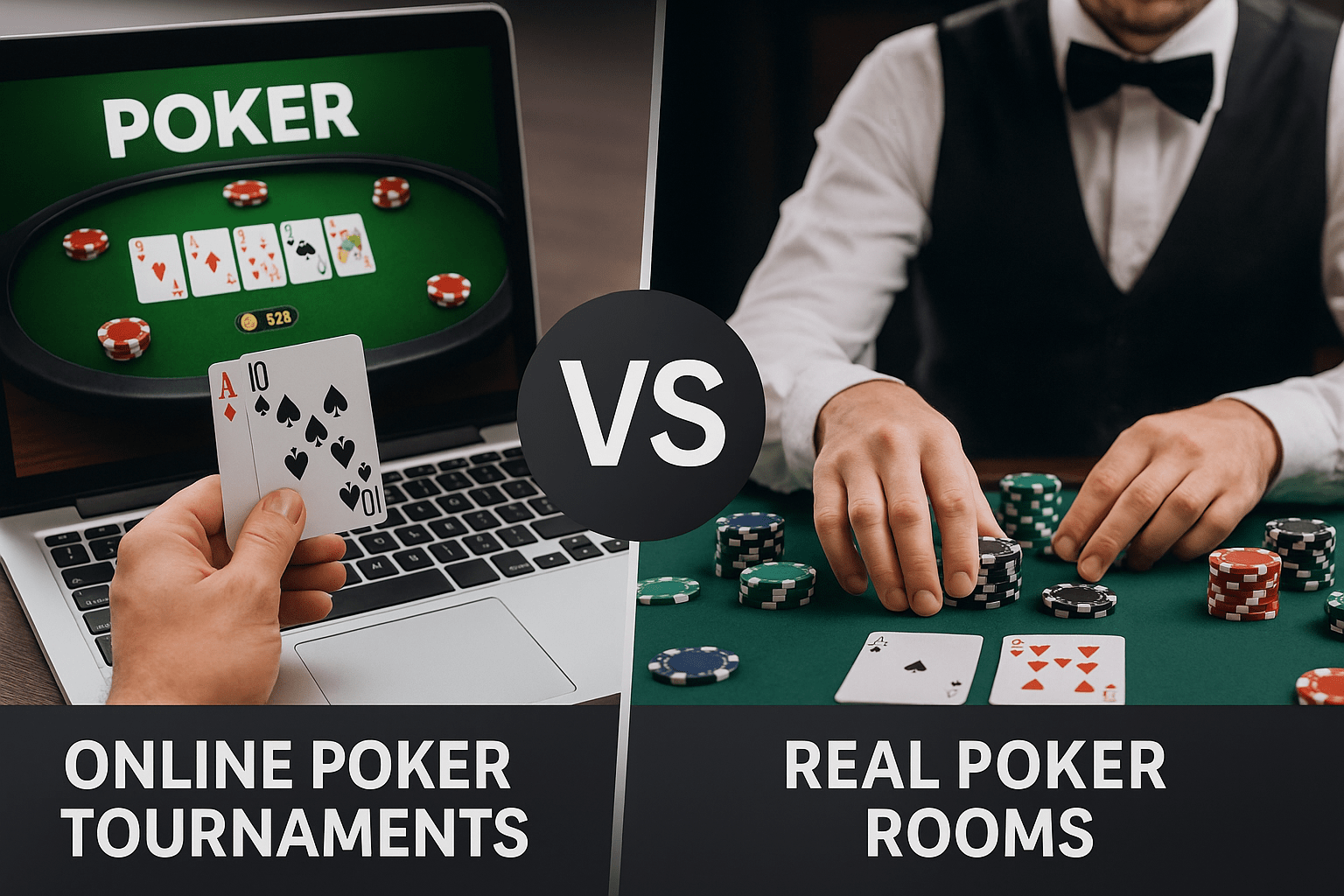Online Poker Tournaments and Real Poker Rooms: How Is the Gaming Option Different?
Poker continues to be a major draw in both traditional and digital formats. From flashy tournaments in Las Vegas to fast-paced online games played through your phone, the variety of settings offers something for every kind of player. As more users download the best mobile casino apps, questions naturally arise about how online poker tournaments compare to real poker room experiences. While the game remains the same in essence, the approach, pace, psychology, and environment differ in significant ways.
The Playing Environment: Physical vs. Virtual
The most immediate distinction between online and real-life poker lies in the setting. One immerses you in digital convenience; the other places you face-to-face with real opponents.
Comparison of Gaming Environments
Location:
Online poker can be played from virtually anywhere—at home, on mobile devices, or while traveling. Real poker rooms require players to be physically present at a specific venue.
Game Pace:
The pace of play is faster online, allowing for significantly more hands per hour. In live poker, the game is slower due to manual shuffling, dealing, and general player interaction.
Number of Tables:
Online players can multi-table, playing several games simultaneously. In contrast, live players are limited to one table at a time.
Social Interaction:
Online interaction is limited, typically restricted to chat features. Live poker offers rich interpersonal dynamics, including conversation, presence, and nonverbal cues.
Physical Tells:
Online environments lack physical tells entirely. In live games, players can observe and interpret body language and other subtle behaviors.
Convenience:
Online poker is highly convenient, offering 24/7 access. Live poker is bound by casino hours and physical location, making access more limited.
Online platforms allow players to participate from virtually anywhere, which is why the best mobile casino apps continue to rise in popularity. But for some, the ambiance and intensity of a real table remain unmatched.
Player Behavior and Strategy
The lack of physical presence changes how players behave and strategize. Online players tend to rely more on statistical reads and rapid decisions, while real poker rooms allow more nuanced psychological gameplay.
Strategic Differences Between Online and Live Poker
Bluffing:
Online bluffing is riskier due to the absence of physical cues. In live poker, bluffing is often more effective thanks to the ability to use body language and facial expressions.
Timing Tells:
Online, players rely on the speed of actions to pick up on timing tells. In live games, these cues come from physical behaviors like body movement, eye contact, and posture.
Note Taking:
In online play, note taking is often assisted by software. In live settings, it’s usually done manually or mentally.
Opponent Tracking:
Online players can use hand histories and databases to track opponents. Live players rely on memory and observation.
Betting Patterns:
Online betting tends to be faster and influenced by algorithms or HUDs. Live betting is generally more emotional and varied in style.
Because of these differences, many players who dominate online may initially struggle in live rooms and vice versa. Adapting your strategy is key depending on where you're playing.
Stakes, Prizes, and Accessibility
Both formats cater to players across all bankrolls, but their structure and accessibility can be quite different. Online tournaments are easier to access and often have lower buy-ins, while live games may come with travel, lodging, and dress-code considerations.
Poker Accessibility by Format
Minimum Buy-In:
Online poker allows players to enter games with very low stakes, sometimes as little as $1. In contrast, real poker rooms typically require a minimum buy-in of $50 or more.
Entry Frequency:
Online tournaments and games are available around the clock, with multiple options every hour. Live poker rooms have scheduled events, often limited to a few per day or week.
Satellite Tournaments:
Satellites are very common online, providing frequent chances to qualify for larger events. In live settings, they are much rarer and usually only tied to high-stakes tournaments.
Player Base:
Online poker connects a global community of players, offering a wide variety of opponents. Live poker rooms, however, tend to attract a localized or regional player base.
Special Events:
Online platforms host seasonal tournament series that players can join from anywhere. Live poker features major events like the World Series of Poker (WSOP), European Poker Tour (EPT), and World Poker Tour (WPT), which require physical attendance and travel.
Online poker makes tournament entry easy and cost-effective, allowing beginners to play competitively without large financial risk. Meanwhile, real poker rooms often deliver bigger cash prize pools—but at a higher upfront commitment.
Security, Fairness, and Regulations
While cheating and unethical behavior exist in both formats, the type and methods differ. Online platforms rely on algorithms and account monitoring, while live games require floor staff, surveillance, and personal ethics.
Online Security Tools:
- RNG (Random Number Generator) for fair card distribution
- Bot detection software
- Geo-verification for jurisdictional legality
Live Room Security:
- Cameras monitor hands and chips
- Trained dealers spot irregular betting
- Pit bosses resolve disputes on the floor
In both cases, licensed operations are required to meet regulatory standards. Whether online or physical, it's vital to play on platforms or venues that are legally certified and well-reviewed.
Which One Should You Choose?
The better option depends entirely on your priorities. If you value accessibility, faster action, and the flexibility to play anywhere, online tournaments—especially through the best mobile casino apps—are ideal. If you crave psychological warfare, live reads, and the feel of chips in your hand, real poker rooms offer the traditional experience.
For many seasoned players, a hybrid approach works best—refining skills online while applying them in live tournaments when time and travel allow. Poker may be a single game, but its experience changes dramatically based on the environment in which it's played. Both avenues offer rewards, and both require unique adjustments in skill, mindset, and preparation.

